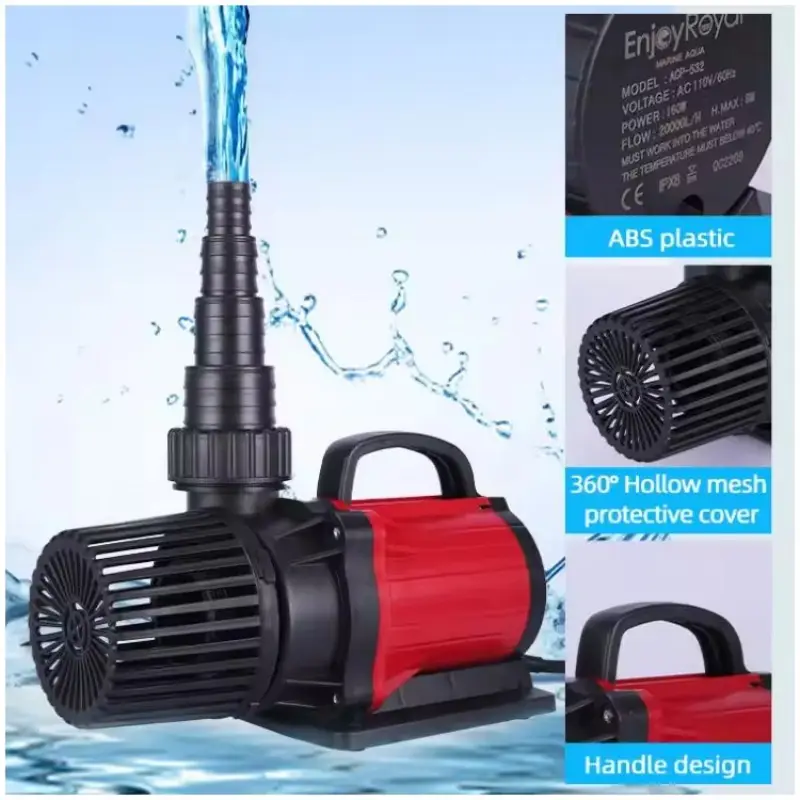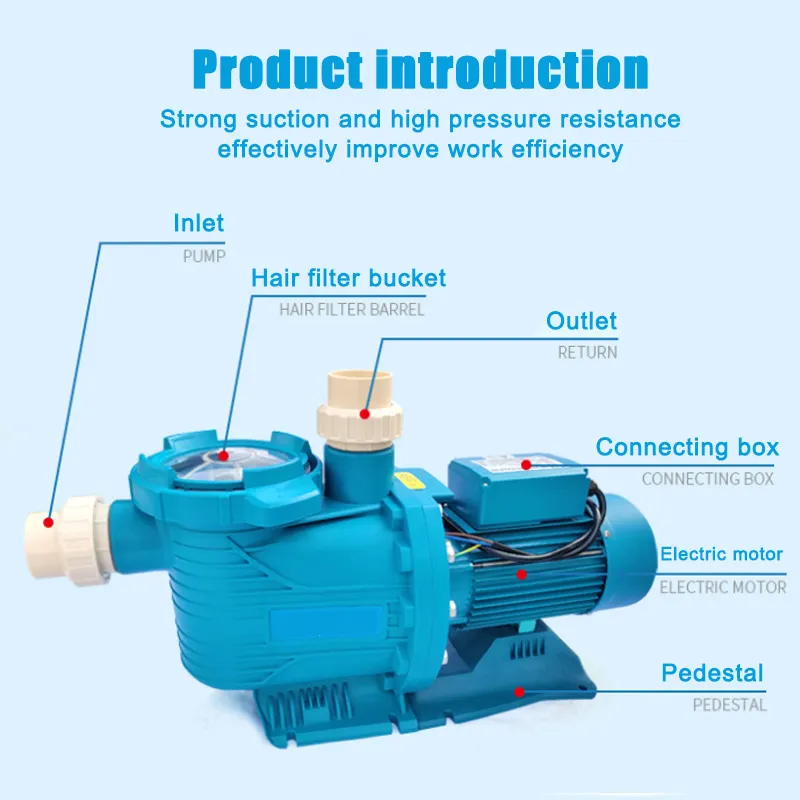تعزيز النظام الكفاءة مع مضخات المياه الموفرة للطاقة
في مختلف الصناعات، أصبحت حفظ الطاقة هدفًا رئيسيًا، خاصة فيما يتعلق بنظم مناولة السوائل. يُعد اختيار مضخة مياه موفرة للطاقة أحد أكثر الطرق فعالية لخفض استهلاك الطاقة في حين تحسين أداء النظام. صُمّمت هذه المضخات المتقدمة لتلبية متطلبات التطبيقات المختلفة مع تقليل التكاليف التشغيلية، مما يجعلها أصلًا أساسيًا في العالم اليوم الذي يركز على الحفاظ على البيئة.
خفض التكاليف وتوفير الطاقة
فواتير الكهرباء المنخفضة
مضخة مياه موفرة للطاقة مضخة المياه تقلل بشكل كبير من استهلاك الكهرباء مقارنة بالطرز التقليدية. من خلال تحسين تشغيل المحرك والتصميم الهيدروليكي، تضمن هذه المضخات استهلاك كمية الطاقة اللازمة فقط أثناء التشغيل. وهذا ينعكس في تقليل تكاليف المرافق الشهرية لكل من المستخدمين السكنيين والصناعيين.
مكاسب مالية على المدى الطويل
على الرغم من أن التكلفة الأولية لشراء مضخة مياه موفرة للطاقة مضخة المياه قد تكون أعلى قليلاً، إلا أن الادخار الذي يحدث على مدى عمرها الافتراضي يمكن أن يفوق الاستثمار الأولي. وتؤدي الحاجة الأقل إلى الصيانة وانخفاض أعطال التشغيل وطول العمر الافتراضي إلى ميزات اقتصادية على المدى الطويل.
الفوائد البيئية
تقليل انبعاثات الكربون
يمكن أن تساعد استخدام مضخة مياه موفرة للطاقة في تقليل البصمة الكربونية للمنشأة أو المنزل. وبما أن المضخة تستهلك طاقة أقل، فإنها تقلل بشكل غير مباشر من العبء الواقع على محطات توليد الكهرباء، مما يؤدي إلى انخفاض الانبعاثات الغازية الدفيئة. وهذا يجعلها خيارًا مسؤولًا بالنسبة للمستخدمين الواعين للبيئة.
تعزيز الاستدامة
تتماشى أنظمة المضخات الكهربائية الفعالة من حيث استهلاك الطاقة مع أهداف التنمية المستدامة. فهي تدعم الحفاظ على المياه واستخدام الطاقة بشكل مسؤول، مما يساهم في جهود حماية البيئة الأوسع نطاقاً وفي الامتثال للوائح المعمول بها في العديد من المناطق.
تحسين أداء النظام
تصميم مضخة محسّن
يتم بناء المضخات الكهربائية الحديثة الفعالة من حيث استهلاك الطاقة بتصميم متقدم للمكرهة ومحركات عالية الكفاءة. تضمن هذه التحسينات معدل تدفق أكثر سلاسة وتقليل خسائر الاحتكاك وتشغيلًا أكثر استقرارًا تحت ظروف متغيرة.
تقليل التآكل والإنهاك
تعمل النماذج الفعالة من حيث استهلاك الطاقة بجهد أقل على الأجزاء الداخلية. يؤدي انخفاض مستويات الإجهاد إلى تقليل البلى الميكانيكي، ما يقلل بالتالي من فترات التوقف عن العمل ويطيل عمر النظام الكلي.

التنوع الملائم للاستخدام
القابلية للتكيّف عبر القطاعات
تتميز المضخات المائية الموفرة للطاقة بملاءمتها لمجموعة واسعة من الاستخدامات، بدءًا من الري الزراعي وأنظمة المياه البلدية وصولًا إلى أنظمة التدفئة والتهوية وتكييف الهواء (HVAC) والتبريد الصناعي. إن قدرتها على التكيف مع متطلبات الضغط والتدفق المختلفة تجعلها الحل المفضل عبر عدة قطاعات.
التحكمات والمراقبة الذكية
تأتي العديد من طرازات المضخات المائية الموفرة للطاقة بمزايا ذكية مدمجة مثل محركات التردد المتغير (VFDs) ومراقبة الوقت الفعلي وأنظمة التحكم الآلية. تسمح هذه الوظائف للمستخدمين بتعديل أداء المضخة بناءً على الطلب، مما يعزز الكفاءة بشكل أكبر.
انخفاض تكاليف الصيانة والتشغيل
انقطاعات خدمة أقل
بفضل المواد المحسّنة والهندسة الذكية، فإن المضخات المائية الموفرة للطاقة تحتاج إلى صيانة أقل تكرارًا. ويقلل تصميمها القوي احتمالية حدوث أعطال غير متوقعة، مما يضمن استمرارية التشغيل حتى في البيئات الصعبة.
إجراءات صيانة مبسّطة
تم تصميم العديد من هذه المضخات بحيث يسهل الوصول إليها وتفكيكها، مما يُبسّط مهام الصيانة الروتينية. ويؤدي هذا إلى تقليل تكاليف العمالة والوقت المطلوب للصيانة، خاصة في المنشآت الكبيرة التي تستخدم عدة مضخات.
الدعم الحكومي والتنظيمي
الحوافز والخصومات
تقدم عدة حكومات وشركات مرافق مكافآت مالية أو خصومات لتركيب أنظمة مضخات مياه كهروكفاءة. يمكن أن تساعد هذه البرامج في تعويض تكاليف الشراء الأولية وتحفيز اعتماد التكنولوجيا المستدامة على نطاق واسع.
الامتثال لمعايير الطاقة
غالبًا ما تفي مضخات المياه الكهروكفاءة أو تتفوق على معايير الأداء المحلي والدولي للطاقة. وهذا يضمن الامتثال لمراجعة الطاقة والمتطلبات التنظيمية، ويجنّب العقوبات ويعزز سمعة الجهة المعتمدة.
الدعم لاهداف البنية التحتية طويلة المدى
إدارة المياه المحسّنة
يدعم تنفيذ أنظمة مضخات المياه ذات الكفاءة في استخدام الطاقة استراتيجيات إدارة الموارد بشكل أفضل. تساعد هذه المضخات في تحسين توزيع المياه وتقليل الهدر، وضمان إمكانية توسيع الأنظمة لاستيعاب النمو المستقبلي.
حماية الاستثمارات للمستقبل
من خلال الاستثمار في أنظمة حديثة ذات كفاءة في استخدام الطاقة، فإن المنشآت تستعد للامتثال للوائح البيئية المتغيرة والتطورات التكنولوجية. ويُحدث هذا بنية تحتية أكثر مرونة، مما يجعلها قادرة على التكيف مع التحديات والفرص المستقبلية.
الأسئلة الشائعة
ما الذي يجعل مضخة المياه ذات كفاءة في استخدام الطاقة؟
تستخدم مضخة المياه ذات الكفاءة في استخدام الطاقة تقنية محركات محسّنة وتصميمًا هيدروليكيًا مطورًا لتوفير أداء عالٍ باستخدام طاقة أقل. كما تُحسّن الميزات مثل أدوات التحكم بسرعة متغيرة وأجهزة الاستشعار الذكية من الكفاءة.
هل مضخات المياه ذات الكفاءة في استخدام الطاقة أغلى ثمناً؟
على الرغم من أن التكلفة الأولية قد تكون أعلى، إلا أن الادخار طويل الأمد الناتج عن انخفاض فواتير الطاقة والصيانة المنخفضة وزيادة المتانة يبرر عادةً الاستثمار.
هل يمكن استخدام مضخات المياه ذات الكفاءة في استخدام الطاقة في الأنظمة الحالية؟
نعم، صُمّمت العديد من المضخات المائية الموفرة للطاقة بحيث تكون متوافقة مع أنظمة السباكة والكهرباء الحالية، مما يجعل التحديث خيارًا عمليًا واقتصاديًا.
هل تحتاج المضخات المائية الموفرة للطاقة إلى صيانة خاصة؟
ليس بالضرورة. في الواقع، تحتاج غالبًا إلى صيانة أقل مقارنة بالمضخات التقليدية بفضل تصميمها وموادها المحسّنة. ومع ذلك، يُوصى بإجراء فحوصات دورية للحفاظ على الأداء الأمثل.

